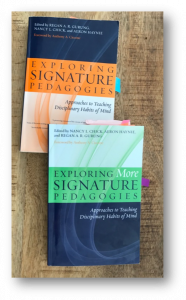In my short time here, I’ve learned something important about the campus: community engaged learning is the signature pedagogy of Rollins College. Follow me here….
First, what is a signature pedagogy?
- Lee Shulman coined the term from his work with the professions, such as law and medicine. A signature pedagogy is “early socialization” to “form habits of the mind, habits of the heart, and habits of the hand” of these fields (Shulman, “Signature Pedagogies in the Professions,” 2005).
- On Shulman’s challenge, the notion of signature pedagogies has been explored within the academic disciplines— as a way of teaching to get students “to understand and practice disciplinary ways of thinking or habits of mind” (Chick, Gurung, & Haynie, “From Generic to Signature Pedagogies,” 2009).

- Michigan State University has proposed a signature pedagogy for their campus, based on its pervasive values, habits, and practices as a large, public, land-grant university of the 21st century. (Youatt & Wilcox, “Intentional and Integrated Learning in a New Cognitive Age: A Signature Pedagogy for Undergraduate Education in the Twenty-First Century,” 2008).
So if a signature pedagogy enacts and embeds the context-specific ways of knowing, doing, and thinking that its learners will carry forward into their future work and lives, then from what I’ve seen, Rollins College has embraced community engaged learning as its signature pedagogy. (To be clear, this doesn’t mean it’s the only learning experience of Rollins students: signature pedagogies are essential and central to but not the only mode of teaching and learning within the profession, discipline, or context. Law students do more than participate in Socratic case dialogues. Medical students do more than go on clinical rounds. Biology students do more than work in inquiry-based labs. Creative writing students do more than the writing workshop. And so on.)
According to the mission, “Rollins College educates students for global citizenship and responsible leadership, empowering graduates to pursue meaningful lives and productive careers.” Beyond just the aspirations of a mission statement and the general principles of small liberal arts colleges, though, the implied values and opportunities for engaging beyond campus are infused across campus in a range of programs and initiatives–not just one or two, as is more common on many campuses. See, for example, the list on the website for the Center for Leadership and Community Engagement.
Significantly, these values and opportunities are also embedded throughout the curriculum. First, the habits of mind of engaging with one’s larger community is central to Rollins’s Foundations in Liberal Arts (rFLA) program, which is more than a course or two. It has 11 requirements, all of which develop and advance this way of thinking. Then, dozens of courses each semester carry the community engagement designation. Again, not just a small handful of courses, and not just in the first or final years, but a breadth that offers students plenty of choices and multiple opportunities throughout their time at Rollins.
I regularly see how members of the campus continue to grow and adapt this commitment, in order to extend the ways in which students understand, practice, and live meaningful engagement with the larger world around them. In the future, I’ll post some of the examples. Stay tuned!